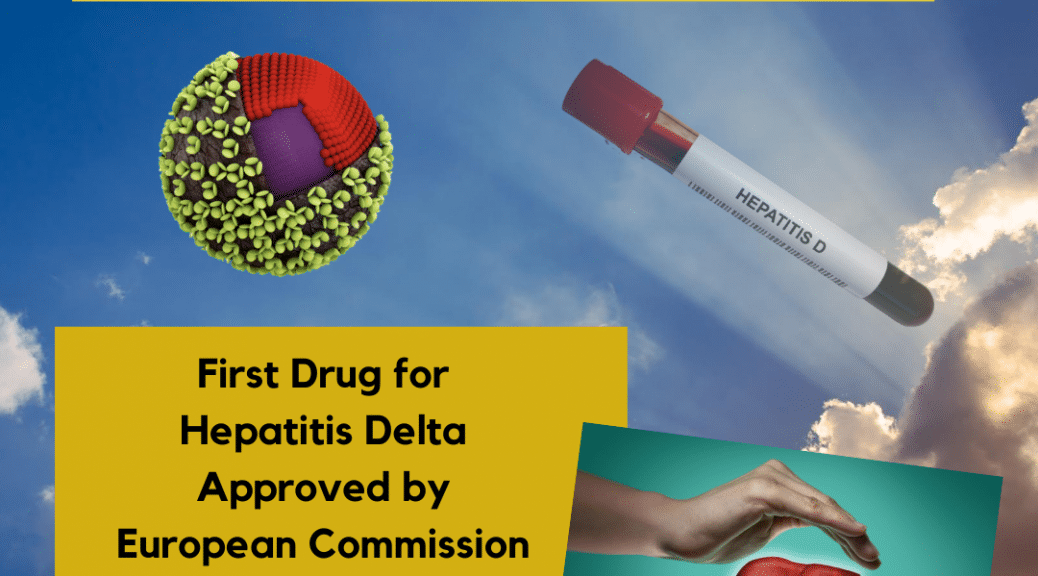New Drug Approved for Treatment of Hepatitis Delta in Europe
A new drug to treat hepatitis delta has now been approved by the European Commission! The drug is called bulevirtide and will be marketed under the brand name Hepcludex. It was previously known at Myrcludex B. This approval follows a quarter century of research and development and is the first drug specifically for hepatitis delta approved in Europe. Due to the high prevalence of the hepatitis delta virus in Russia and the former Soviet Union, it has been approved for use there since the end of 2019, under the name Myrcludex. The European Medicines Agency recommended the drug for approval by the Commission at the end of May 2020 (German Center for Infection Research, 2020).
How Does It Work?
Hepcludex, developed by university researchers in Heidelberg, Germany, works as an entry inhibitor – that is, it prevents hepatitis delta virus (HDV) cells, and the hepatitis B virus (HBV) cells upon which HDV depends, from entering healthy liver cells. Both HDV and HBV cells are able to replicate and thrive exclusively in the liver because they need the bile acid transporter NTCP in order to do so. This transporter is the avenue through which HDV is received into the liver cell. Hepcludex works by blocking this reception process, so that the virus does not continue to infect healthy liver cells (German Center for Infection Research, 2020). The currently infected cells either die or are destroyed by the immune system.
How Have People Responded?
Hepcludex is an injectable medication given daily for 48 weeks. In phase I and II clinical trials, people seemed to respond well to this treatment. It seems that just a small amount of Hepcludex is needed, which is good news because it means that the normal processes of the bile salt transporter (NTCP – the receptor of the hepatitis delta virus) will not be widely disrupted (German Center for Infection Research, 2020). MYR Pharmaceuticals GmbH, which now has the license for Hepcludex, is currently in the process of running further phase II and larger phase III trials, in order to continue to determine long-term effects. Hepcludex has also been tested in combination therapy with PEG Interferon, which is administered weekly also via injection (Highleyman, 2019).
Does it also work for Hep B?
Right now, Hepcludex has been tested and works to treat people with hepatitis delta. Since hepatitis delta becomes the dominant virus in those co-infected with hepatitis B and hepatitis delta, clearing hep delta will not necessarily clear hep B as well. However, the curative properties of this drug for those only affected with hep B are being investigated, both alone and in combination with PEG interferon, and there was a loss of surface antigen (HbsAg) noted in 20% of clinical trial participants who were given this combination (Highleyman, 2019).
What does this mean for patients?
Research thus far indicates that Hepcludex can be more effective than interferon alone, the existing hepatitis delta treatment, which is usually not curative and has challenging side effects (Smith, 2020). Hepcludex is now available for prescription in Europe, although pricing schemes remain unclear. For updated information on pricing and availability, check with your doctor or visit the MYR Pharmaceuticals website here.
Clinical trials will continue to take place for this and other drugs. Researchers and pharmaceutical companies might experience difficulty in recruiting patients for hepatitis delta clinical trials because of a lack of awareness and testing – many people living with hepatitis delta worldwide remain undiagnosed. It is important for people at risk for hepatitis delta to be tested and linked to care if found to be infected. If you have hepatitis delta and are interested in participating in a clinical trial, you can search for one near you. To find a doctor to talk to about getting tested for hepatitis delta if you are living with hep B, click here. Hepatitis delta can often be managed and treated, and you are not alone! The most important first step is to know your status.
What does this mean for providers?
The exact number of people living with hepatitis delta around the world is unknown and estimates range anywhere from 20-70 million. Most of these individuals remain undiagnosed due in large part to a lack of testing and diagnostics. Stephan Urban, one of the researchers leading the effort in the development of Hepcludex has said that, in the United States, fewer than 5% of those tested for hepatitis B are also tested for hepatitis delta (Smith, 2020). It is true that in much of the world diagnostic tools remain unaffordable and so Dr. Urban and his team are developing a much less expensive and rapid test. If the capacity exists, however, testing is crucial for the management of this most severe form of viral hepatitis and all of the subsequent liver conditions that can develop from it. Additionally, as with all infectious diseases, vaccination of ALL people to prevent hepatitis B is critical. Click here for more information on hepatitis delta in general and here for questions and concerns.
References
German Center for Infection Research. (2020, August 5). First drug for hepatitis D has been approved by European Commission. EurekAlert! https://www.eurekalert.org/pub_releases/2020-08/gcfi-fdf080520.php
Highleyman, L. (2019, December 16). Combination therapies show promise against hepatitis D. Retrieved August 31, 2020, from https://www.worldhepatitisalliance.org/latest-news/infohep/3548132/combination-therapies-show-promise-against-hepatitis-d
Smith, J. (2020, August 20). Is Hepatitis D Healthcare Being Overlooked? LabioTech https://www.labiotech.eu/medical/hepatitis-d-ema-approval/


